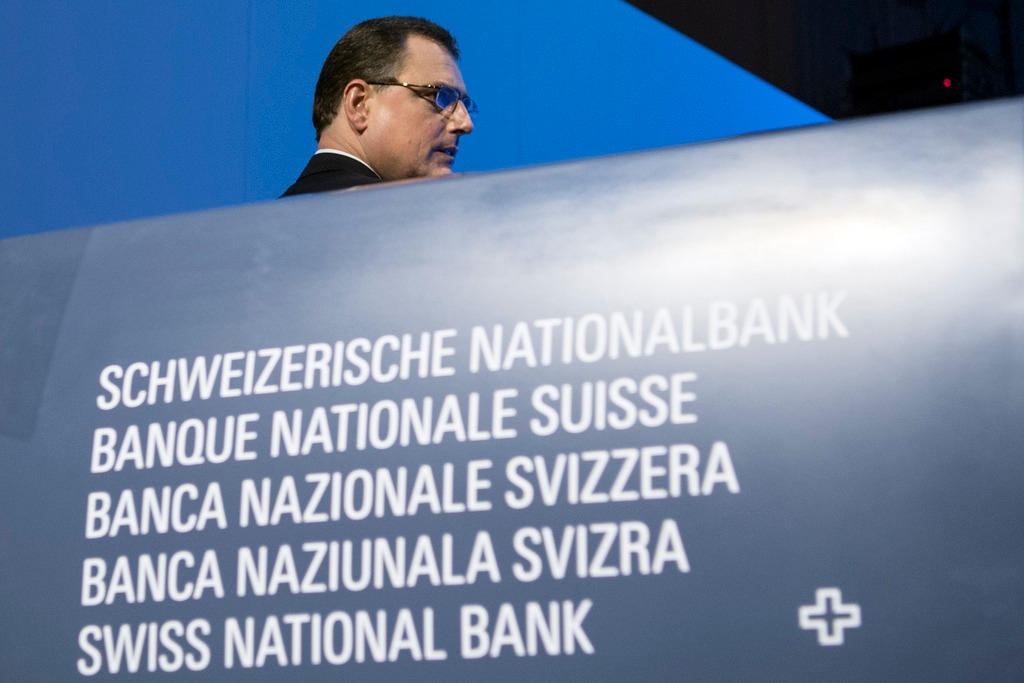‘The ‘sovereign money’ initiative would weaken Switzerland as a financial centre’

Rather than prevent new crises, implementing the “sovereign money” initiative would merely create uncertainty and compromise the competitiveness of Swiss banks, says Philippe Bacchetta.
According to the professor of economics at the University of Lausanne, the excesses of the banking sector are primarily due to incompetence and a lack of prudence.
swissinfo.ch: According to the proponents of this initiative, the creation of money by commercial banks encourages speculation and financial bubbles. Does this view correspond to reality?
“A number of aspects relating to how this initiative would be implemented are unclear. It would create a new level of uncertainty that would weaken Switzerland as a financial centre.”
Philippe Bacchetta: No, this view has nothing to do with reality. Theoretically, it’s conceivable that a link could exist between money creation and speculation, but in reality no serious study has ever demonstrated such a link. What’s more, the proponents of this initiative present no evidence in this direction.
swissinfo.ch: The financial sector has faced a number of crises in the past 20 years. Isn’t the “sovereign money” initiative a good solution to prevent excesses in the banking sector?
P.B.: Absolutely not. An analysis of recent crises shows that the money covered by the initiative (that is, current accounts) doesn’t affect the likelihood of a financial crisis. Excesses in the banking sector are often caused by a lack of prudence – or sometimes by incompetence – in allocating loans or in asset purchases. This behaviour wouldn’t be affected by the initiative. We must remember that current accounts only comprise about 20 percent of bank liabilities and that in periods preceding crises, it is other forms of liability that increase.
swissinfo.ch: Do you consider regulations adopted in Switzerland in the past years sufficient to reinforce the stability of the financial marketplace, for example in relation to the big banks’ own reserves?
P.B.: I think that increasing banking reserves is desirable. But it would be preferable if this increase took place at a global level, so that Swiss banks don’t lose international competitiveness.

More
Sovereign Money initiative in a nutshell
swissinfo.ch: Wouldn’t it be safer to allocate the role of issuing money to the Swiss National Bank (SNB) alone, instead of also leaving this task in the hands of commercial banks operating purely for profit and not in the public interest?
P.B.: The term “issuing money” is misleading. In the Middle Ages, the Prince issued coins. At a later stage, central banks began to issue notes. But the “sovereign money” initiative concerns neither notes nor coins, but bank accounts. What is more, just as there are different types of bank accounts, there are different ways of measuring money. At the moment the SNB controls the central bank’s money, also known as the monetary base, which is comprised of bank deposits at the SNB.
This initiative, by contrast, calls for the public’s current accounts to be directly controlled by the SNB (this would not include savings accounts.) But if the SNB is compelled to control current accounts, that would complicate its monetary policy. It would also complicate the process by which commercial banks grant loans, and would therefore be harmful for companies.
swissinfo.ch: The banking sector can issue money. Doesn’t that give it an unjustifiable competitive advantage compared with other sectors of the economy?
P.B.: No, once again, the terminology is misleading. If the banking sector “issues money,” this means that it can credit accounts in the context of a loan operation. This isn’t a competitive advantage, it is simply an action linked to credit activities. This credit activity is specific to banking, so it’s natural that other sectors don’t contribute to this money creation.

More
‘Cosmetic reforms will not stop another financial crisis’
It is also imperative to make clear that the banks’ potential to increase the number of current accounts doesn’t represent wealth creation, because this also implies a debt for the banks. The principle source of income comes from the interest differential between deposits and loans.
swissinfo.ch: Could the “sovereign money” initiative reinforce the credibility and stability of the Swiss financial market, as the proponents claim?
P.B.: No, on the contrary. At the moment, current accounts provide a stable source of financing for banks. Under the “sovereign money” system, the banks might have to finance each other, which means less stable sources of funding, and thus increased instability. What is more, a number of aspects relating to how this initiative would be implemented are unclear. Its implementation would create a new level of uncertainty that would weaken Switzerland as a financial centre.
swissinfo.ch: According to the initiative, the SNB could allocate newly created money to the federal government, the cantons or directly to citizens without creating debts. Billions of francs which are not used at the moment could be distributed collectively. Isn’t this a good enough reason to accept the initiative?
P.B.: The idea that money on the SNB’s account would not be a debt is incorrect both on the accounting level and on the level of economic logic! This implies that the SNB can sell its assets at any moment and distribute the proceeds of such a sale. This demagogic proposal is very dangerous and would raise questions about the credibility of the SNB and the Swiss economic system.
We should note that this distribution of SNB funds has nothing to do with the fundamental idea of “sovereign money” and could also be introduced within the current system. There are some very strong reasons for not doing so in the current system, or in any other monetary system.
Translated from German by Catherine Hickley, swissinfo.ch

In compliance with the JTI standards
More: SWI swissinfo.ch certified by the Journalism Trust Initiative












You can find an overview of ongoing debates with our journalists here . Please join us!
If you want to start a conversation about a topic raised in this article or want to report factual errors, email us at english@swissinfo.ch.